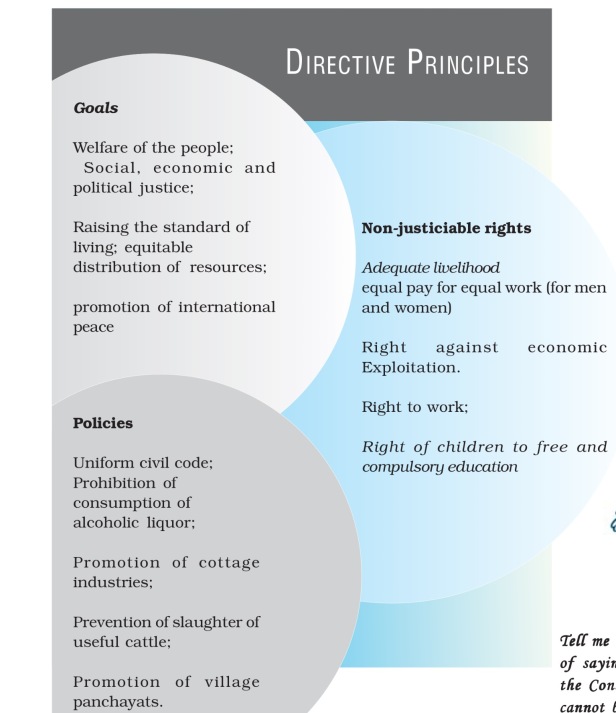- The makers of our Constitution knew that independent India was going to face many challenges. Foremost among these was the challenge to bring about equality and well-being of all citizens.
- They also thought that certain policy direction was required for handling these problems. At the same time, the Constitution did not want future governments to be bound by certain policy decisions.
- Therefore, some guidelines were incorporated in the Constitution but they were not made legally enforceable: this means that if a government did not implement a particular guideline, we cannot go to the court asking the court to instruct the government to implement that policy. Thus, these guidelines are ‘non-justiciable’ i.e., parts of the Constitution that cannot be enforced by the judiciary.
- Those who framed our Constitution thought that the moral force behind these guidelines would ensure that the government would take them seriously.
- Besides, they expected that the people would also hold the governments responsible for implementing these directives. So, a separate list of policy guidelines is included in the Constitution.
- The list of these guidelines is called the Directive Principles of State Policy.
What do the Directive Principles contain?
- The chapter on Directive Principles lists mainly three things: the goals and objectives that we as a society should adopt; certain rights that individuals should enjoy apart from the Fundamental Rights; and certain policies that the government should adopt.
- The governments from time to time tried to give effect to some Directive Principles of State Policy.
- They passed several zamindari abolition bills, nationalised banks, enacted numerous factory laws, fixed minimum wages, cottage and small industries were promoted and provisions for reservation for the uplift of the scheduled castes and scheduled tribes were made.
- Such efforts to give effect to the Directive Principles include the right to education, formation of panchayati raj institutions all over the country, partial right to work under employment guarantee programme and the mid-day meal scheme etc.
Fundamental Duties of citizens
- In 1976, the 42nd amendment to the Constitution was passed.
- Among other things, this amendment inserted a list of Fundamental Duties of Citizens.
- In all, ten duties were enumerated. However, the Constitution does not say anything about enforcing these duties.
- As citizens, we must abide by the Constitution, defend our country, promote harmony among all citizens, protect the environment.
RELATIONSHIP BETWEEN FUNDAMENTAL RIGHTS AND DIRECTIVE PRINCIPLES
- It is possible to see both Fundamental Rights and Directive Principles as complementary to each other.

- Fundamental Rights restrain the government from doing certain things while Directive Principles exhort the government to do certain things.
- Fundamental Rights mainly protect the rights of individuals while directive principles ensure the well-being of the entire society.
- However, at times, when government intends to implement Directive Principles of State Policy, it can come in conflict with the Fundamental Rights of the citizen. This problem arose when the government sought to pass laws to abolish zamindari system. These measures were opposed on the ground that they violated right to property.
- However, keeping in mind the societal needs that are greater than the individual interests, the government amended the Constitution to give effect to the Directive Principles of State Policy.
- This led to a long legal battle. The executive and the judiciary took different positions. The government claimed that rights can be abridged for giving effect to Directive Principles. This argument assumed that rights were a hindrance to welfare of the people.
- On the other hand, the court held the view that Fundamental Rights were so important and sacred that they cannot be limited even for purposes of implementing Directive Principles.
- This generated another complicated debate. This related to the amendment of the Constitution. The government was saying that Parliament can amend any part of the Constitution. The court was saying that Parliament cannot make an amendment that violated Fundamental Rights.
- This controversy was settled by an important decision of the Supreme Court in Kesavananda Bharati case. In this case, the court said that there are certain basic features of the Constitution and these cannot be changed by Parliament.
Right to Property
- Behind the controversy about the relationship between rights and directive principles, there was one important reason: in the Constitution, originally, there was a fundamental right to ‘acquire, possess and maintain’ property.
- But the Constitution made it clear that property could be taken away by the government for public welfare.
- Since 1950, government made many laws that limited this right to property. This right was at the centre of the long debate over the relationship between rights and directive principles.
- Finally, in 1973, the Supreme Court gave a decision that the right to property was not part of the basic structure of the Constitution and therefore, parliament had power to abridge this right by an amendment. In 1978, the 44th amendment to the Constitution removed the right to property from the list of Fundamental Rights and converted it into a simple legal right.









